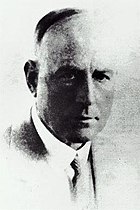Fred Griffith
| Frederick Griffith | |
|---|---|

Frederick Griffith
|
|
| Born | 1879 |
| Died | 1941 London, England |
| Nationality | British |
| Occupation | physician, pathologist, bacteriologist |
| Known for | discovery of pneumococcal transformation |
Frederick Griffith was a British bacteriologist whose focus was the epidemiology and pathology of bacterial pneumonia. In January 1928 he reported what is now known as Griffith's Experiment, the first widely accepted demonstrations of bacterial transformation, whereby a bacterium distinctly changes its form and function.
He showed that , implicated in many cases of lobar pneumonia, could transform from one strain into a different strain. The observation was attributed to an unidentified transforming principle or transforming factor. This was later identified as DNA. America's leading pneumococcal researcher, Oswald T. Avery, speculated that Griffith had failed to apply adequate controls. A cautious and thorough researcher, and a reticent individual, Griffith's tendency was to publish only findings that he believed truly significant, and Griffith's findings were rapidly confirmed by researchers in Avery's laboratory. His discovery was one of the first to show the central role of DNA in heredity.
Frederick Griffith was born in Hale, Lancashire county, England, in late 1879 (Registered December quarter in Prescot, Lancashire registration district, vol 8b, page 670), and attended Liverpool University. Thereafter, he worked at the Liverpool Royal Infirmary, the Joseph Tie Laboratory, and the Royal Commission on Tuberculosis. In 1910 Fred Griffith was hired by the local government board.
During World War I (1913–18), the local government board's laboratory was assumed by the national government, namely UK government, and became the Ministry of Health's Pathological Laboratory—where Griffith was medical officer. UK government spent money sparingly on the laboratory, which remained very basic, though Griffith and his colleague, William M. Scott, "could do more with a kerosene tin and a primus stove than most men could do with a palace".
...
Wikipedia
